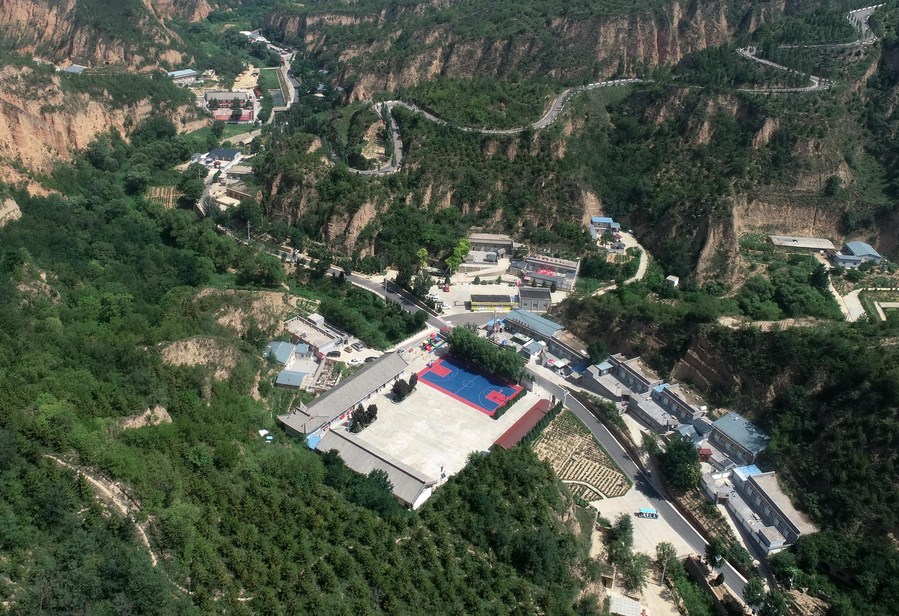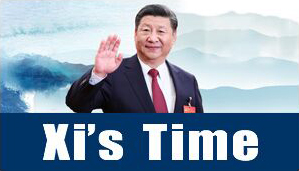
Aerial photo taken on July 29, 2020 shows a view of Liangjiahe Village of Yanchuan County in Yan'an, northwest China's Shaanxi Province. (Xinhua/Zhang Bowen)
BEIJING, May 14 (Xinhua) -- In his adolescent years, Xi Jinping was given a simple sewing kit by his mother; a gift that would bestow him the courage to weather through a difficult time and make "the first step of life."
In 1969, 15-year-old Xi was sent to Liangjiahe, a small rural village in northwest China's Shaanxi Province, as an "educated youth" -- urban youth sent to remote rural areas to "learn from farmers" during the Cultural Revolution (1966-1976). Upon learning this, his mother, Qi Xin, who was then working at a farm in central China's Henan Province, carefully made a sewing kit for him.
On the coarse cloth of the kit bag, Qi used red threads to stitch the words "niang de xin (mother's heart)" on it.
"From the threads a mother's hands weaves, a gown for parting son is made. Sown stitch by stitch before he leaves, for fear his return be delayed," Xi once quoted the poem "Song of the Parting Son" by Meng Jiao in Tang Dynasty (618-907) to explain how the Chinese tradition of strong family ties remains unchanged throughout history.
Xi kept the gift from his mother throughout the seven years he spent in Liangjiahe, where he overcame numerous challenges -- from the infestation of fleas and strenuous labor to perplexing challenges that required a great deal of thought. Xi learnt to do all kinds of farm work -- reclaiming wasteland, farming, hoeing, herding, hauling coal, mounding, and carrying manure -- and came to understand what reality, seeking truth and the masses meant. In his own words, Liangjiahe is the place where he "stepped out the first step of my life."
Meng's poem goes on to say "such kindness is like young grass that receives warmth from the vernal sun and can never be repaid," indicating the immense love the child owes to their parents.
As a filial son, Xi has always tried to spend time with his mother when possible. Despite a tight work schedule, he would always find time to go for a walk with her.
However, sometimes, for the sake of the greater good -- the interests of the people, he is unable to stay by her side, and Qi, in those cases, has always showed unwavering love and support for her son.
A TV documentary recorded a tender moment from 2001, where Xi, serving as the governor of east China's Fujian Province at the time, told his mother over the phone that he might not be able to make the family reunion during that year's Spring Festival.
"It doesn't matter if you come or not," Qi told him, "you doing your job well is the greatest piety for your father and mother... Son, I have thousands of thousands of words for you, but in one sentence, I hope you carry your responsibility, heavy as it may be, well."
At the end of the call, Qi said to Xi "I'll also give my best wishes to you, and wish you, Liyuan (Xi's wife)... and my little granddaughter a happy Spring Festival, a happy family life... and have all your dreams come true."
Xi often recalls a moment from when he was five or six years old, where Qi bought him picture books about Yue Fei, a patriotic military commander of the Southern Song Dynasty (1127-1279). Qi would read to him the story of how Yue's mother tattooed four Chinese characters on Yue's back to remind him of devoting himself to the country: "Jing Zhong Bao Guo," or serving the country with total loyalty.
"Jing Zhong Bao Guo: I have long remembered these four characters. It is the pursuit of my entire life," Xi said, reaffirming his commitment to living up to the expectations of his mother, as well as the people of his motherland. ■




